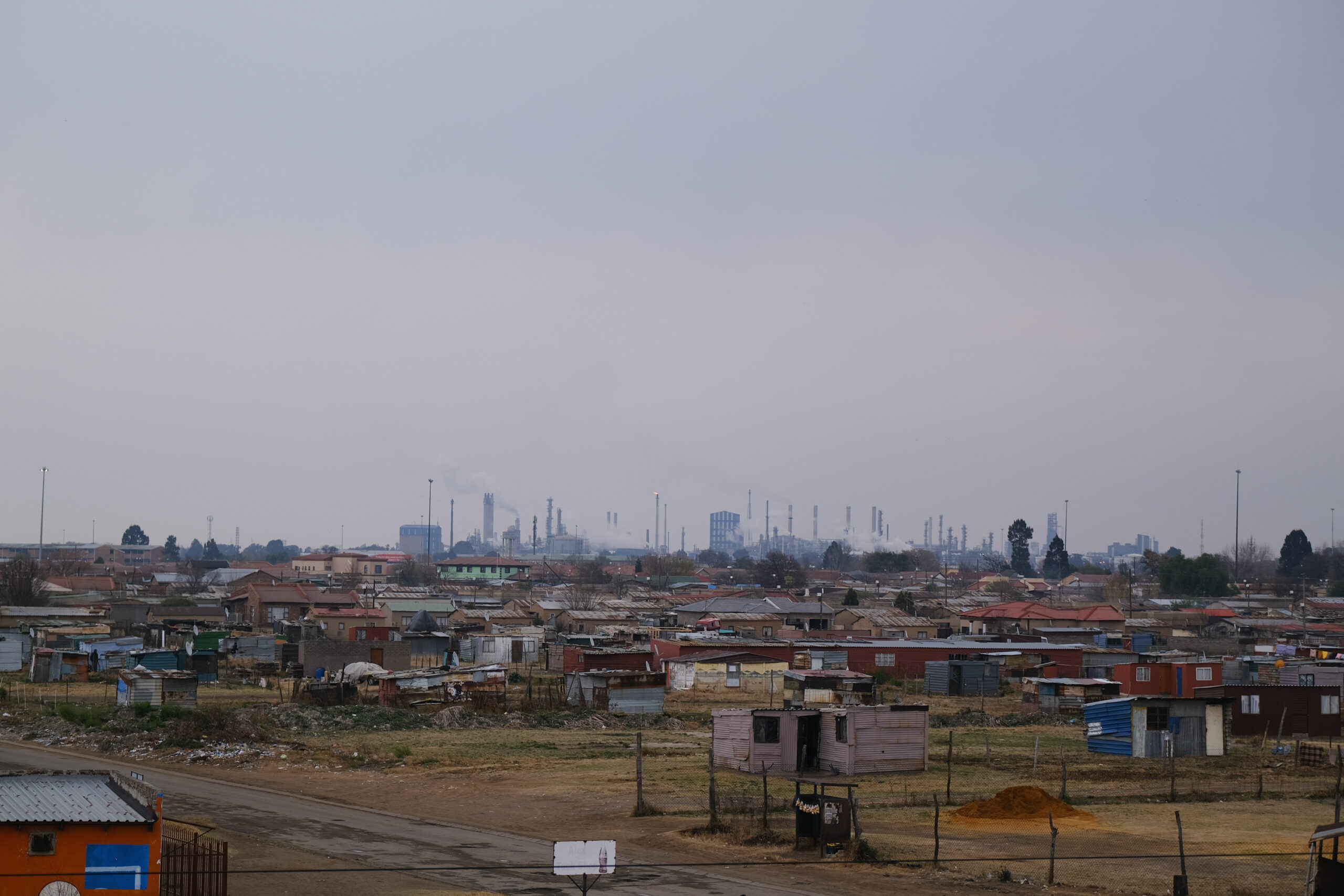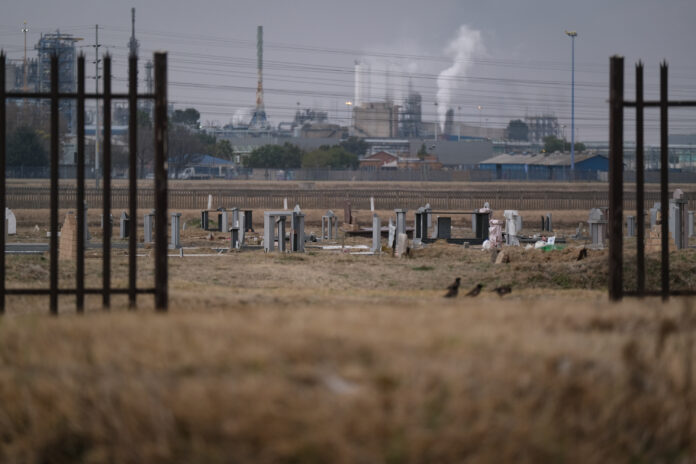By Diana Chiyangwa
Free State Province, South Africa: An acrid smell lingers in the air of Zamdela, a small township in South Africa’s Free State province. The community sits in the shadow of Sasol, one of Africa’s largest coal-producing plants, where air pollution has become an unwelcome but accepted part of daily life. For decades, the people of Zamdela have endured the toxic consequences of high carbon emissions, and their health, and livelihoods sacrificed in the name of economic progress.
Kiddo Mafisa, a lifelong resident of Zamdela, has battled asthma since childhood. The thick, polluted air aggravates her condition, leaving her with little hope for a healthier future. “There are no alternative job opportunities for women here,” Mafisa laments. “Many of us depend on our husbands who work at Sasol, but we bear the brunt of the pollution.”
Beauty Jantjie and Victoria Riet, members of the Zamdela Air Quality Monitoring Committee (ZAQMAC), have tried to carve out a livelihood through gardening and recycling projects. But even the soil rebels against the pollution—plants wither and die due to contamination from mining residues. “We were given space to garden at the arts center, but no matter what we do, the pollution kills our plants,” says Jantjie.
For many women in Zamdela, the future promised by a “Just Energy Transition” feels like an illusion. They are already excluded from the coal economy and shut out of jobs due to failing health screenings at the mines and power plants. Worse still, they face the lingering threat of exploitation—reports of bribes and sex-for-jobs scandals in mining communities persist.

Matshidiso Tsvinyane, a climate change activist and ZAQMAC member, sees little progress. “In five years, I’ve seen no real job opportunities created for local women,” she says. “I still hear stories of people being asked for bribes or sexual favors to get hired. It’s heartbreaking.”
A local woman, who requested anonymity, confirms these claims. “We apply for jobs at Sasol even when we don’t qualify, just in case. But more often than not, they ask for ‘dintshontsho’—bribes—or worse, sexual favors.”
Beyond economic exclusion, the community continues to suffer the dire effects of pollution. Mining operations deplete and contaminate local water sources, leaving residents with unhealthy, undrinkable water. Mafisa and her fellow activists have seen the consequences firsthand: “We’ve had too many cases of pregnant women giving birth to babies with deformities, skin rashes, eye infections, and respiratory problems,” she says.
A 2017 study by Groundwork estimated that coal-related air pollution claims 2,239 lives in South Africa each year. Over 9,500 children between the ages of six and twelve suffer from bronchitis due to exposure. Yet, despite the undeniable harm, South Africa remains reluctant to transition away from coal. The country has yet to sign the proposed Fossil Fuel Non-Proliferation Treaty, and coal remains the backbone of its economy.
Sasol, in a recent media statement, expressed optimism about a newly announced “Clean Trade and Investment Partnership” between South Africa and the European Union. The agreement is intended to support South Africa’s transition to a lower-carbon economy. However, environmental groups like Just Share are not convinced. They argue that the government is giving Sasol a free pass on carbon emissions and toxic air pollution.
One of the biggest concerns is South Africa’s weak carbon tax policies. The latest budget review allows companies like Sasol to retain a 60% tax-free allowance on emissions until 2030. According to Just Share, this is a step backward. “The current carbon tax is too low to incentivize real change,” the group argues. “Polluters must pay for the damage they cause.”
The issue extends beyond emissions. Climate change activists in Zamdela highlight the lack of meaningful engagement with the Presidential Climate Change Commission (PCC), which was established to oversee South Africa’s energy transition. “The Just Energy Transition is supposed to be about fairness and inclusion,” says Tsvinyane. “But here in Zamdela, we’re not seeing any benefits. Our health is still at risk. Our voices are still ignored.”
During his State of the Nation Address, President Cyril Ramaphosa spoke of the Just Energy Transition’s momentum, highlighting over $13 billion in international pledges and increased private investment. However, with the United States recently withdrawing support for Just Energy Transition Partnerships in South Africa, Indonesia, and Vietnam, activists worry that progress may stall.
Meanwhile, Sasol continues its legal battles with the Zamdela community, dating back to 1998. While the courts have repeatedly ruled in favor of residents, enforcing these rulings remains a challenge. Pollution continues, and the promises of community investment remain unfulfilled. “They once verbally agreed to support our community projects,” says Jantjie, “but nothing ever materialized.”
Residents suspect corruption is delaying progress. “How can someone from Sasolburg, now working as an Air Quality Manager, claim ignorance of the pollution we’re dealing with?” an anonymous resident asks. “It’s clear he’s been bribed.”
The struggle for a just energy transition in Zamdela is not just about cleaner energy—it’s about justice. Until the government and corporations prioritize the health and well-being of affected communities, the promise of a fair transition remains empty words. For the people of Zamdela, true justice means clean water, clean air, and real economic opportunities—not just policy statements and empty promises.
At the time of publishing this article, there was no response from Eskom.














